Chickens need to be tested for worms regularly. If there is a build up of worms in their digestive system that can cause health problems. Keeping chickens in a fixed area as so many of us do, where they are grazing the same piece of ground continually is the worst case scenario as they will be contaminating the ground and picking up worm eggs as they are feeding. Infected hens shed thousands of eggs in their faeces onto the ground and so, the problem gets worse.
How can you tell if they need worming? By using a Worm Count Kit! Using a kit means you’re not worming chickens unnecessarily.
Wormers
I use a product containing Flubendazole when necessary to worm my chickens. This is a proven chemical wormer that kill all common worms and their eggs in the chicken and is the only product licensed for use in chickens feed. In between these times, I use Verm-X which has approval for use in Organic systems – now this is a herbal product which works in a different way – you will need to feed this to your hens every month for it to work. The really great thing about Verm-X is that being herbal, it contains many ingredients that are good for your birds so it can improve their overall health.
Good Husbandry
Practising good husbandry techniques is key, in between worming chickens. We try to rotate our birds grazing area every month so that they get some fresh grass but so the ground also gets to rest (this is one of the major principles in Organic farming) and we keep the grass mowed short which allows the ultra-violet light from the sun to reach droppings and kill off worm eggs.
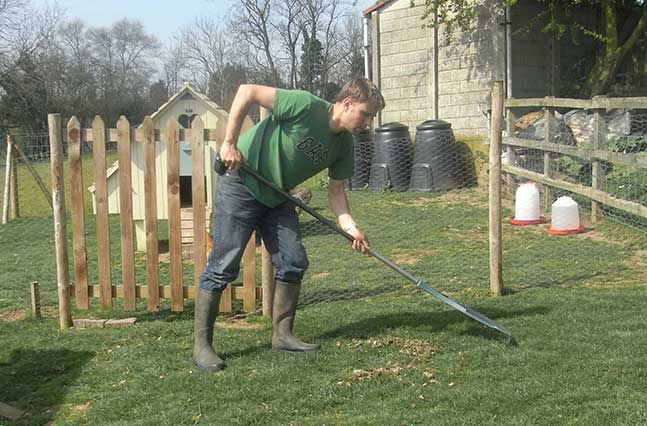
Cleaning a chicken run by raking droppings during dry weather.
General cleanliness is of course important so if your chickens scratch around in their own droppings, you should be thinking about cleaning them up, rather than hitting them with a regular dose of chemicals.
Bad Infestations
If you have a bad infestation of worms, you do need to keep in mind that eggs deposited on the ground will re-infect your birds and it is necessary to repeat the treatment before the eggs hatch and grow into adult worms to lay more eggs. This takes 3 weeks for most common worms carried by chickens so I would re-treat after 3 weeks if I suspect a particularly bad case of worms.
Where external parasites are found on the bird (such as Northern fowl mite or lice) a systemic wormer / pour on product containing Ivermectin is useful. This kills a more limited range of worms. Victoria Roberts Diseases’s of Free Range Poultry says it excludes tapeworm and fluke, but these are less common in chickens. It isn’t licence for use on poultry so you would need to go to your vet for their advice.
Please remember this should not replace the advice of a qualified veterinarian who can advise you about worming.
Do you have any advice on worming? Please leave me a comment below.

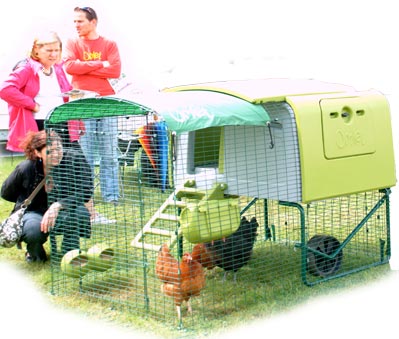

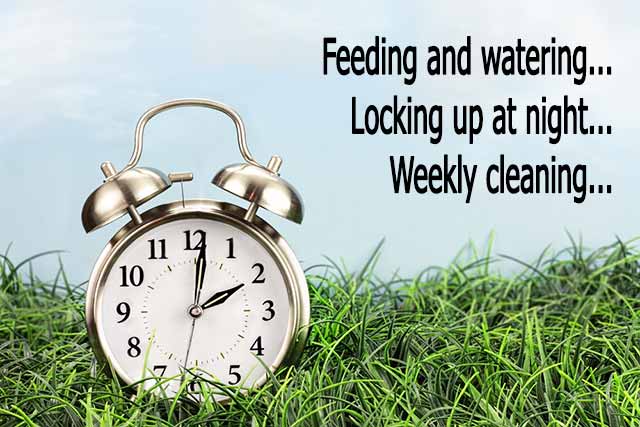
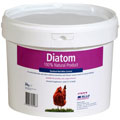
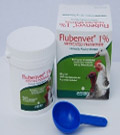
I am a complete novice having purchased 2 Faverolls in Oct fully grown. One seems to have yellow runny droppings. Someone has suggested worming them. Is this an indication that they need worming or something more serious. They have the run of my garden. I have not had any eggs yet.
It could be normal – there is a dropping that is frothy / french mustard colour called a calcial (sp?) dropping that comes out every couple of days. Have a look at the poultrykeeper page on the Digestive System of a Chicken which explains this.
On the other hand, it could be a problem – I would keep a close eye and visit a poultry vet if there are other symptoms or if it continues without ‘normal’ droppings in between.
Can you recommend exactly how much flubenvet per chicken? I would like to measure it out separately so I know that each one gets the correct amount. I only have 3 hens so it is hard to know how to divide it. Thank you.
I can’t I’m afraid – it is tested and licensed to be used by adding to a given weight of feed and the amount each hen consumes is related to their food consumption over a 7 day period. It will therefore be different for each hen, depending on her consumption.
This is a really common question on forums and some people like to give one ‘dose’ to a hen on a half a grape or similar. This is not the correct way to give Flubenvet and the hen is getting the medication in one high dose. Nil egg withdrawal is only when it is given as per the instructions and the large dose might be stripping the gut lining causing damage to the hen.
For 3 average hens, they should eat 130g or so per hen so that’s say 400g of food per day for 7 days = 2.8Kg. I would mix 3Kg of feed with Flubenvet and feed for the 7 days. If you think this is too much, mix 2Kg and see how you get on.
My chickens apparently have tapeworms. I can see the small segments in the droppings. What product is best for taking care of this type?
They are fairly uncommon. If you have had this confirmed by a worm sample then I would visit your vet as they will need to prescribe Flubenvet at above the standard dose and have a withdrawal period. The vet may chose a different product as they rarely stock Flubenvet. If not confirmed as Tapeworm, I would give them a standard Flubenvet dose (see my Flubenvet page) first and then re-check to see if this has had the desired effect.
There is more information on Tapeworms in Chickens here.
I read your reply to Jessie P about the quantity of Flubenvet per hen per week and it seems a lot of food for my twelve hens and cockrells.If I have worked it out as you said in this reply for the three hens it is 400grms x 4 making twelve hens =1600grams x 7 days =11200grams =11.2 kl of food for them all per week.They don’t eat this amount of food in a week.
This all seems to me to be a bit iffy on the amounts we are suposed to give them.per day per helping per week?
I think I must be a bit dim as I can’t seem to get my head around this ,and don’t want to damage by birds as I love them all.
The amount of Flubenvet you are adding to the food does not change. This is fixed so you will not harm your hens if you mix it according to the instructions and feed this ad-lib for 7 days as per the instructions. There is now a certain percentage of Flubenvet in your feed… but the calculation comes in when you ask how much of this feed you will need to medicate for a week…
So the calculation was done to work out how much food the hens might eat in the week as you don’t want to end up with too little or too much medicated food at the end of the week.
A chicken eats roughly 130g of food per day – but it varies according to their size of course. So 12 hens would be roughly: 12 x 130g x 7 days = 10.9Kg of food (just over half a bag) that would then need mixing with Flubenvet at the dosage recommended in the instructions.
If half a bag seems too much then your hens are eating less than 130g per day – you could easily measure how much they eat in a week before treating them I guess.
Does this only happen if your chicken eats worms?
Chickens pick up worms and eggs directly off the ground, or indirectly from eating ‘intermediate hosts’ such as earthworms or insects that themselves have eaten worm eggs.